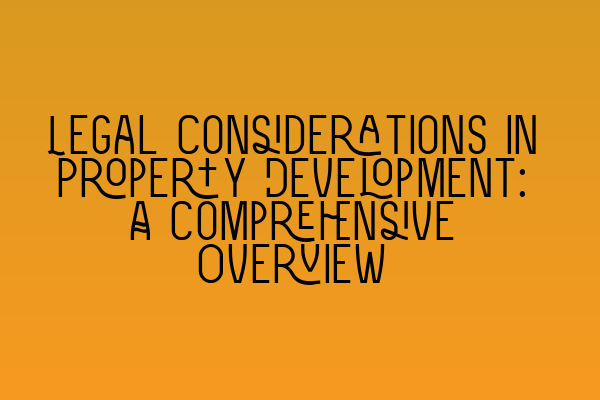Legal Considerations in Property Development: A Comprehensive Overview
Property development is a complex and multifaceted process that requires careful consideration of various legal aspects. Whether you are a seasoned developer or embarking on your first real estate project, it is crucial to have a solid understanding of the legal framework surrounding property development. In this article, we will provide you with a comprehensive overview of the key legal considerations in property development.
1. Planning and Zoning
One of the first legal considerations in property development is planning and zoning regulations. These regulations dictate how land can be used, the type of structures allowed, and the overall development plans for a particular area. It is essential to conduct thorough research and understand the planning policies and local zoning codes that apply to your property. Engaging the services of a qualified planning consultant can help you navigate through these regulations efficiently.
When it comes to planning and zoning considerations, it is also important to assess the potential impact of the development on the surrounding environment, infrastructure, and community. Environmental assessments, traffic impact studies, and public consultations may be required to ensure compliance with legal requirements and mitigate any potential negative impacts.
2. Contracts and Agreements
Property development involves multiple parties, including landowners, developers, contractors, architects, and lenders. Having legally binding contracts and agreements in place helps protect the interests of all parties involved. It is crucial to engage the services of a property law solicitor to draft, review, and negotiate these contracts.
Common contracts and agreements in property development include purchase agreements, development agreements, construction contracts, and financing agreements. These documents outline the rights and responsibilities of each party, timelines, payment terms, and dispute resolution mechanisms. Thoroughly understanding the terms and conditions of these contracts is essential to avoid any potential legal disputes.
If you are looking for SQE-related courses and exam support, FQPS provides comprehensive SQE 1 preparation and SQE 2 preparation courses to help you maximize your chances of success.
3. Due Diligence and Title Issues
Before proceeding with a property development project, conducting comprehensive due diligence is crucial. This includes investigating title issues, surveying the property, and assessing any potential legal obstacles that may arise. Ensuring that the property has a clear title with no encumbrances or unresolved disputes is essential to protect your investment.
Working with an experienced property law solicitor can help you identify any potential title issues early on and provide guidance on how to resolve them. They can also assist in obtaining necessary permits, licenses, and consents required for the development project.
4. Financing and Securities
Securing adequate financing for property development projects is often a significant challenge. Understanding the different financing options available and the associated legal requirements is crucial. This may include traditional bank loans, private financing, crowdfunding, or joint ventures.
When seeking financing, lenders often require security in the form of a mortgage or charge over the property. It is important to ensure that the necessary legal documentation, such as debentures or guarantees, is in place. Engaging the services of a property law solicitor experienced in financing matters can help you navigate through these legal complexities.
To stay updated with the latest SRA SQE exam dates, check out FQPS’s SRA SQE Exam Dates page.
5. Construction and Health & Safety
Construction is a crucial stage in property development that requires compliance with health and safety regulations. Ensuring a safe working environment and adherence to construction standards is not only a legal obligation but also essential for the success of your project.
Working with qualified architects, contractors, and other professionals who have a strong understanding of construction law and health and safety regulations is essential. They can guide you through the legal obligations and ensure that all necessary permits and certificates are obtained before commencing construction.
6. Dispute Resolution
Despite careful planning and consideration, legal disputes can still arise during property development projects. These may include disputes with contractors, suppliers, neighboring property owners, or local authorities. Resolving these disputes efficiently and effectively is essential for the continued progress of your project.
Engaging the services of a property law solicitor who specializes in dispute resolution can help you navigate through these legal complexities. Alternative dispute resolution methods, such as negotiation, mediation, or arbitration, may be explored to avoid lengthy and costly court proceedings.
In Conclusion
Property development involves a myriad of legal considerations that require careful attention and expertise. By understanding and addressing these considerations from the outset, you can minimize potential legal risks and maximize the success of your project. Engaging the services of a qualified property law solicitor can provide you with the necessary guidance and expertise throughout the entire property development process.
If you are looking for additional resources and support for your SQE exam preparation, FQPS offers SQE 1 Practice Exam Questions and SQE 1 Practice Mocks FLK1 FLK2 to help you confidently approach your exams. Additionally, FQPS provides comprehensive SQE 1 and SQE 2 preparation courses to help you excel in your studies.
